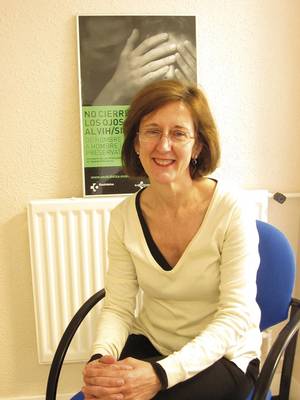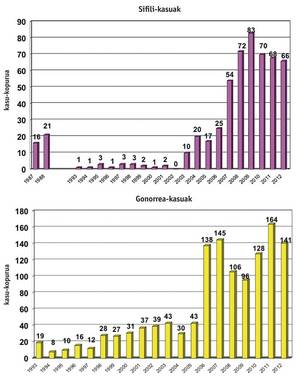Sexual diseases: here still
Shame, fear, ignorance... are words with which some associate sexual diseases. Arantxa Arrillaga Arrizabalaga, however, uses much more words of prevention, treatment and progress when dealing with the subject. Arrillaga is one of those responsible for the Osakidetza AIDS and Sexually Transmitted Infections Plan, and although he speaks without panic, he understands that some are afraid of the issue. In his opinion, there are still tasks in this area.
In fact, while data on new HIV infections have stabilized, in recent years other sexually transmitted diseases have increased considerably. This shows that the situation is not relaxing. However, according to sexologist Aitziber Estonba Mintxero, few people publicly express their concern for these diseases, not even before the expert. "For many it remains a taboo or a difficult topic to talk about."
Data on AIDS patients and new HIV infections were systematically collected in Osakidetza for 17 years. This allows us to analyze the evolution of AIDS and HIV infections. Thus, it is observed that it is the first year of data collection in which the largest HIV infections occur in 1997. In fact, 229 cases were reported. Since then, despite the small fluctuations that have occurred over the years, 2013 was the year in which fewer cases were recorded: 143 new infections.
Arrillaga explained that as important as knowing the number of cases is knowing how infections have occurred, which allows them to know where they should pay special attention and how they should act in prevention. In fact, in addition to the epidemiological work, they carry out prevention plans within the Osakidetza AIDS and Sexually Transmitted Infections Plan, and also work in the clinical field, since it is in charge of coordinating the work done in the infectious disease units of hospitals.
Therefore, seeing the trend of recent years, Arrillaga believes that they have reason to think that they are "on the right track", "it seems that the plans are adequate and that the information reaches the recipients", he stressed. And in saying this, it refers to HIV infections: "Although we also record cases of AIDS, this information is not so representative, since the development of antiretroviral treatments has significantly reduced cases."
On the contrary, it has considered of great interest another data, the means of transmission of the virus, since its evolution has been "very significant", according to Arrillaga: "In the early years, until the late 1990s, transmission of the virus was associated with drug injection syringes. Little by little, sexual relations became the main way of transmission of the virus and today, in nine out of 10 cases, it is the way of transmission of the virus."

In recent years, it is also significantly associated with certain practices: "Most new infected are men who have had sex with men." Specifically, in 2012 56% of new infections were due to this cause, as happened last year. According to Arrillaga, this incidence is disproportionate, since people who have this practice are much less than half of those who have sex. "That's why we're especially concerned right now."
Data, conclusions and measures
In addition, Arrillaga warns that other infections are occurring in this same group, especially syphilis and gonorrhea. Both are produced by bacteria (the first is caused by the bacteria Treponema pallidum and the second by Neisseria gonorroheae), which are easily cured by antibiotics and the condom is effective to prevent contamination. However, if not treated, these are serious diseases that are also easily sexually transmitted without preventive measures.
According to Arrillaga, both syphilis and gonorrhea have increased both among these people, highlight the existence of gaps. Along with this, the data shows other strokes: "There are three specific consultations on sexually transmitted diseases, one in each territory. To facilitate their approach, they attend directly to patients, that is, they do not have to go to the family doctor. In addition, they are anonymous, that is, they are not registered in Osakidetza. Now it's also changing."
The legal status of immigrants, the informatization of consultations and other factors are making it difficult for people in need to access these special consultations. However, as they remain of direct and anonymous access, Arrillaga has said that they do work of sentinels. "This allows us to know the evolution that sexual diseases are experiencing, both quantitatively, that is, both qualitatively and qualitatively, the characteristics of patients. Then this data is very useful for us to adapt the plans."
At the moment, the data seem "worrisome" to Arrillaga: Since 2002 cases of syphilis have been increasing, and the trend is the same in cases of gonorrhea since 2005, and 74% of these cases of syphilis and 43% of cases of gonorrhea were in men who had sex with men.
Arrillaga has recognized that it has not been easy to direct specific actions to this group because of the "risk of stigmatization". For example, NGOs have taken it with suspicion. Arrillaga has spoken clearly: "It is difficult to spread in the general media a campaign specifically aimed at a group."
Therefore, it indicates that since the administration they have always acted very cautiously, although in recent years it is the NGOs themselves that have requested specific measures, since the situation is really worrying. Thus, in winter 2011, Osakidetza launched a campaign to prevent HIV transmission and other sexually transmitted infections targeting men who have sex with men. "Do not close your eyes to AIDS. The slogan of the campaign was "From man to man, use the condom" and an on-line consultation aimed at this collective was launched. This consultation continues and in it, in addition to receiving information and resolving doubts, they can attend HIV and syphilis analyses.
Quick test success
Apart from this special campaign, Arrillaga stands out among the prevention programs derived from the Osakidetza AIDS and Sexually Transmitted Infections Plan, the rapid test performed in pharmacies, which is giving very good results.
With this initiative, Osakidetza has been a pioneer throughout Europe. The service is provided in 46 pharmacies in the three territories of the Autonomous Community of the Basque Country, with special features: It detects HIV and syphilis, is anonymous and the result is received in 15 minutes.
Arrillaga gives more details: "In 2009 we started offering rapid tests in pharmacies, so we have been around for 5 years. At first we only tested HIV, but since 2011 we also offer syphilis to men who have had sex with men. To make HIV you have to pay 5 euros, which is the cost of the test, but because of the concern generated by syphilis they are offered free of charge the syphilis test".
After five years, Arrillaga values "very positively": "During this period, 14,000 people have taken the test in pharmacies, while receiving information and preventive advice from professionals specially prepared for it." In fact, a few drops of blood are taken by a finger for the test. To know the result you have to wait 15 minutes and during that time the pharmacist maintains a conversation with them to clarify their concerns and advise them. For this, pharmacists receive both practical and theoretical training.
The reliability of the test is very high, similar to the conventional blood test. If the result is negative, 100% say they have no HIV infection. "Therefore, the analyzed person can be calm if it has been 3 months since he was at risk of infection, since the antibodies are not detected until they have been infected and have been a few weeks," said Arrillaga.
On the contrary, if it is positive it must be confirmed since the reliability is 99.7%. "As there is a small risk of false positive, from the pharmacy is transferred to the reference center to the person who has given the positive result. In the reference center they attend this person as soon as possible and give him the final result the same day or the next".
Of the 14,000 tests performed, 0.9% were positive. Of those who have gone to the test, 72% are men, with an average age of 36.6 years. The main practice of risk that has led them to perform the test is vaginal penetration (53%), followed by anal penetration and fellatio (10%) and cunnilingus (4%). 21% have gone to the pharmacy after having practiced other activities and only 1% do not know or do not answer. The main reason for the pharmacy test is speed for 42%, accessibility for 35% and anonymity for 11%. Arrillaga is clear: "The system works very well."

Know to play
Other sexual disease prevention campaigns are aimed at young people. According to Arrillaga, it is a special group, because it is natural to risk and feel harmless. "Adults often ignore the risk, but at that age, between information and behavior, psychosocial factors have a great influence."
The surveys confirm what Arrillaga said. In fact, according to the latest report published by the Basque Youth Observatory, 59,000 young people from 15 to 29 years of age in the Basque Country have had a dangerous sex relationship in the year before the interview (18% of youth).
Therefore, it seems important to Arrillaga not only to inform but also to work on social skills and emotional skills. To this end, in collaboration with the Department of Education, they have a specific program in schools to prevent sexual diseases and unwanted pregnancies and a sexual education program through the Internet on the Sexumuxu portal.
On the other hand, along with those of the Osakidetza Plan, many other professionals are working in this field. One of them is sexologist Aitziber Estonba. Estonba's job is to resolve people's doubts and concerns about sexuality and help anyone over 16 at Zarautz's sex counseling office.

According to Estonba, it is hard for people to talk and ask about these issues, which is why it gives special importance to create a climate of trust between the user of the service and the advisor, and strives to do so.
However, you acknowledge that the office receives few questions or queries about sexual diseases. Most users are young from 16 to 18 and are very mixed. "They suffer a great informative bombardment, but they are not able to understand and internalize that information and have a lot of false beliefs."
He also recalled that these young people have not known the hardest years of AIDS, which in some cases has meant underestimating the risk of HIV infection. "They regard AIDS as a chronic and less serious disease, and it seems distant to them, since not even AIDS patients are prominent. They therefore consider it less necessary to take protective measures."
Estonba believes they also have little information about syphilis and gonorrhea: "They think XVIII. They are diseases of the twentieth century and do not realize that they are also current and that they are spreading". According to Estonba, these concerns and lack of information are more frequent among those who have heterosexual sex than among men who relate to men. "People with homosexual practices are more aware of the risk of contagion, and they are also better informed and talk more about these issues."
Estonba believes that it is essential to receive sex education, but not only in youth, but also on the basis of fear. If not, sexual relationships are related to fear and disease, when they are pleasure, desire, sharing, love...








